A ball is projected vertically up such that it passes through a fixed point after a time and , respectively. Find
(a) the height at which the point is located with respect to the point of projection.
(b) the speed of projection of the ball.
(c) the velocity of the ball at the time of passing through point .
(d) (i) the maximum height reached by the ball relative to the point of projection , and
(ii) maximum height reached by the ball relative to point under consideration.
(e) the average speed and average velocity of the ball during the motion from to for the time and , respectively.
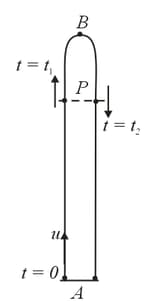
(b) the speed of projection of the ball.
(c) the velocity of the ball at the time of passing through point .
(ii) maximum height reached by the ball relative to point under consideration.


Important Questions on Kinematics I
Two particles and are projected simultaneously with velocities and , respectively. Particle is projected vertically up from the top of a cliff of height and particle is projected vertically up from the bottom of the cliff. If the bodies meet
(a) above the top of the cliff,
(b) between the top and bottom of the cliff, and
(c) below the bottom of the cliff, find the time of meeting of the particles.
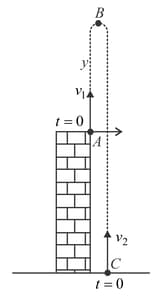
A body is thrown vertically upwards from , the top of a tower. It reaches the ground in time If it is thrown vertically downwards from with the same speed it reaches the ground in time If it is allowed to fall freely from , then find the time it takes to reach the ground.
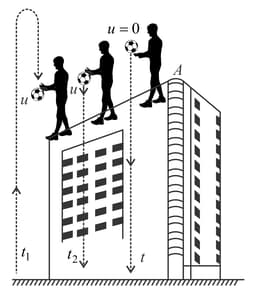
A balloon starts rising upwards with constant acceleration and after time second, a packet is dropped from it which reaches the ground after seconds of dropping. Determine the value of
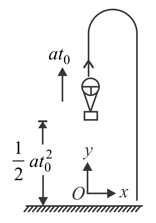
(a) Show that the velocity acquired by a particle in sliding down an inclined plane is the same as that acquired by a particle falling freely from rest through a distance equal to the height of the inclined plane.
(b) Find the time taken in sliding a particle down the whole length of the incline.
Ball is released from the top of a smooth inclined plane, and at the same instant ball is projected from the foot of the plane with such a velocity that they meet halfway up the incline. Determine:
(a) the velocity with which balls are projected and
(b) the velocity of each ball when they meet.
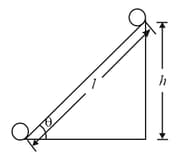
Mark the following statements as true or false.
(a) (i) A ball thrown vertically up takes more time to go up than to come down.
(ii) If a ball starts falling from the position of rest, then it travels a distance of during the third second of its fall
(iii) A packet dropped from a rising balloon first moves upwards and then moves downward as observed by a stationary observer on the ground.
(iv) In the absence of air resistance, all bodies fall on the surface of earth at the same rate.
